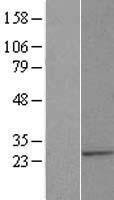order histories, retained contact details for faster checkout, review submissions, and special promotions.
Forgot password?
order histories, retained contact details for faster checkout, review submissions, and special promotions.
Location
Corporate Headquarters
Vector Laboratories, Inc.
6737 Mowry Ave
Newark, CA 94560
United States
Telephone Numbers
Customer Service: (800) 227-6666 / (650) 697-3600
Contact Us
Additional Contact Details
order histories, retained contact details for faster checkout, review submissions, and special promotions.
Forgot password?
order histories, retained contact details for faster checkout, review submissions, and special promotions.
ALG14
ALG14, UDP-N-acetylglucosaminyltransferase subunit
ALG14 is a member of the glycosyltransferase 1 family. The encoded protein and ALG13 are thought to be subunits of UDP-GlcNAc transferase, which catalyzes the first two committed steps in endoplasmic reticulum N-linked glycosylation. Mutations in this gene have been linked to congenital myasthenic syndrome (CMSWTA). Alternatively spliced transcript variants have been identified.
| Gene Name: | ALG14, UDP-N-acetylglucosaminyltransferase subunit |
| Synonyms: | ALG14 |
| Target Sequences: | Q96F25 Q96F25 |

If you do not find the reagent or information you require, please contact Customer.Support@LSBio.com to inquire about additional products in development.










